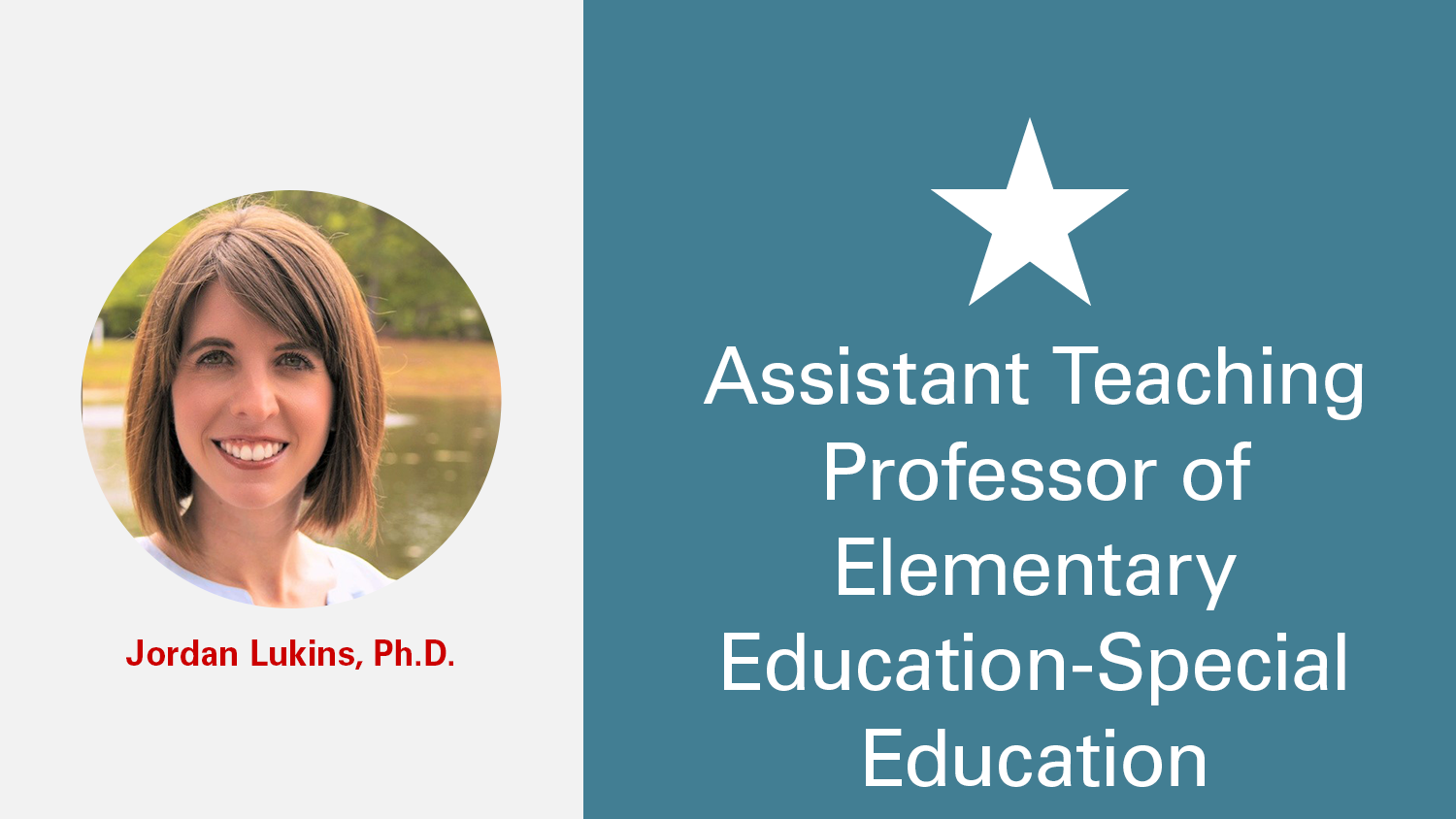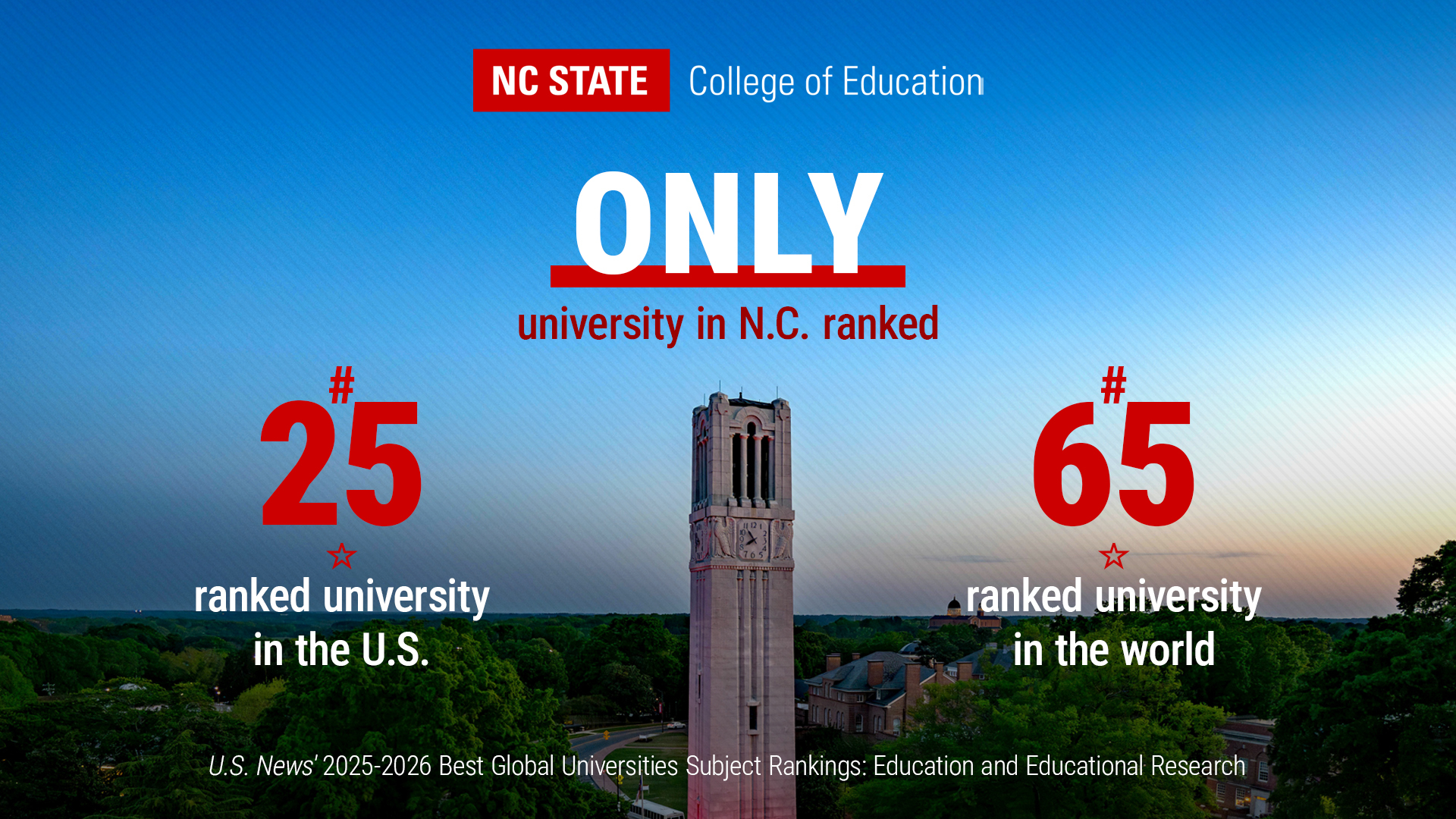Meet Assistant Teaching Professor Jordan Lukins: ‘I Have Been Driven By a Passion to Create Classrooms and Schools Where All Students Are Valued, Included’

This is part of a series of profiles about new faculty who have joined the College of Education in the 2021-22 academic year.
Name: Jordan Lukins, Ph.D.
Title: Assistant Teaching Professor of Elementary Education-Special Education
Education: Ph.D. in Applied Developmental Sciences and Special Education from the University of North Carolina at Chapel Hill, M.Ed. in Special Education from East Carolina University, Bachelor of Arts in Elementary Education and Special Education from Elon University
Experience: University supervisor, East Carolina University; Special Education Module Content Developer, Pathway to Practice; Exceptional Children Teacher, Alamance-Burlington School System; Exceptional Children Program Specialist for Autism, Alamance-Burlington School System
Why did you choose a career in education?
I have always loved learning and had so many excellent teachers who nurtured and encouraged that spirit. I knew from a young age that I wanted to teach others and quickly recognized that education was the most powerful tool for making a difference in the world.
What drew you to your specific field?
I committed to becoming a special educator all the way back in middle school, after becoming friends with several of my classmates with disabilities in an inclusive physical education class. Although I couldn’t put it into words yet, I saw how deficit-focused education could be, especially when it came to students with cognitive, physical, psychological or learning differences, and I wanted that to change. As my career has progressed, I have been driven by a passion to create classrooms and schools where all students are valued, included and provided with the individualized tools and support they need to succeed.
Why did you decide to pursue a doctoral degree?
After teaching for several years, I was promoted to a district level position with responsibilities for leading professional development and coaching special educators. In that role, I discovered my passion for teaching teachers. A doctoral degree was the next step in my journey toward expanding my reach beyond the four walls of my own classroom.
What are your research interests?
Broadly, I am interested in understanding the experiences of pre-service special educators, measuring teachers’ perceptions of the acceptability and feasibility of evidence-based practices, and translating the principles of Universal Design for Learning into both formal and non-formal educational settings.
What sparked your interest in those topics?
All of these topics stem from my desire to bridge the persistent gap between educational research and teaching practice. I value engaged and actionable research that makes a scholarly contribution while simultaneously providing direct benefits to teachers, students, schools, and communities.
What is one research project or moment in your academic career that you are particularly proud of?
A few years ago, I received a fellowship to conduct community-engaged research in partnership with the Animal Park in Mebane, North Carolina. We worked together to assess the zoo’s disability accessibility, build capacity and plan new initiatives for inclusion. This project really expanded my conception of inclusive education outside of the traditional school classroom. I am particularly proud of this work because of its participatory nature in the local community with an organization I have been involved with for nearly a decade.
What is your teaching philosophy?
I strive to practice what I preach by creating a universally-designed environment
incorporating multiple means of student engagement, varied representations of content and options for action and expression. I value assignments and experiences that are not only hands-on but minds-on, inviting my students to think critically and apply their new knowledge to authentic problems. I also recognize my responsibility to prepare pre-service teachers for the everyday realities of teaching and the ever-changing landscape of education. I work hard to build connections between course content and actual educational policies and processes that my students will encounter in schools.
What do you hope your students learn from you?
I hope my students learn to challenge their assumptions about disability and difference and to create equitable, inclusive environments for all students. Whether their official job title turns out to be general educator or special educator, I want students to leave my classes with a commitment to doing the critical work of inclusion—questioning the structures that continue to exclude, embracing the strengths of every student and actively breaking down barriers to learning in their own future classrooms.
What makes someone an “extraordinary educator?”
An extraordinary educator goes beyond concepts and skills to make learning authentic, personalized and transformative. These teachers leverage the strengths of each and every learner and are committed to equipping and empowering them to reach their full potential.
- Categories:


